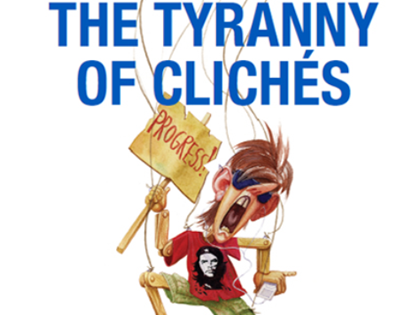Ed. Note: Over the course of the next four days, Big Government will publish exclusive excerpts from Jonah Goldberg’s new book, “THE TYRANNY OF CLICHÉS: HOW LIBERALS CHEAT IN THE WAR OF IDEAS,” with introductions from the author.
In recent years it has become fashionable to argue that conservatives are too hidebound and locked into their ideological dogmas. The times have changed but conservatives cannot change with them (something the left has been saying about conservatives for centuries, of course). “Today’s conservatives” writes New York Times writer and editor Sam Tanenhaus in his book The Death of Conservatism, “resemble the exhumed figures of Pompeii, trapped in postures of frozen flight, clenched in the rigor mortis of a defunct ideology.” Moments later those figures came to life for the tea parties and delivered the Republicans a historic midterm election victory…. –J.G.
—–
This defunct ideology business was taken to absurd extremes by Andrew Sullivan, a blogger and author who at times seemed driven to a kind of nonclinical dementia by his irrational hatred for George W. Bush and conservatism generally. A self-proclaimed disciple of the philosopher Michael Oakeshott, Sullivan testified for a gnawing need for a new or renewed “conservatism of doubt.” “As a politics,” Sullivan writes in his The Conservative Soul, its essence is an acceptance of the unknowability of ultimate truth, an acknowledgment of the distinction between what is true forever and what is true for the here and now, and an embrace of the discrepancy between theoretical and practical knowledge. It is an anti-ideology, a non-program, a way of looking at the world whose most perfect expression might be called inactivism.16
I find the words enticing and admirable. But as anyone who has read Sullivan’s work knows well, the sermon has no relationship to the man preaching it. It’s all very well and good to decry certainty and extol empiricism, but it’s quite another to live by such values. The reality is that Sullivan is using the Trojan Horse of conservative empiricism to deliver an army of theoretical, theological, and ideological certainties fi ghting under the banner of humility and doubt. Boiled down, Sullivan’s crusade amounts to the exact same shtick I’ve been describing: Defend your own “way of looking at the world”–i.e., your Weltanschauung–as coolly pragmatic and empirical while describing your opponents’ as blindly and dangerously ideological. Those who disagree with the excitable Sullivan are immediately cast as ideologues, “Christianists,” fundamentalists, bigots, and fools.
Make no mistake, Sullivan’s approach is more moralistic than empirical, more preachy than skeptical. While he’s not a complete stranger to facts and data, his real aim is to elevate the conscience–specifi cally, his own–above any external source of authority. To make his case, he invokes a famous ancient Chinese tale from a footnote in Oakeshott’s essay “Rationalism in Politics”:
Duke Huan of Ch’i was reading a book at the upper end of the hall; the wheelwright was making a wheel at the lower end. Putting aside his mallet and chisel, he called to the Duke and asked him what book he was reading. “One that records the words of the Sages,” answered the Duke. “Are those Sages alive?” asked the wheelwright. “Oh, no,” said the Duke, “they are dead.” “In that case,” said the wheelwright, “what you are reading can be nothing but the lees and scum of bygone men.” “How dare you, a wheelwright, find fault with the book I am reading. If you can explain your statement, I will let it pass. If not, you shall die.” “Speaking as a wheelwright,” he replied, “I look at the matter in this way; when I am making a wheel, if my stroke is too slow, then it bites deep but is not steady; if my stroke is too fast, then it is steady, but it does not go deep. The right pace, neither slow nor fast, cannot get into the hand unless it comes from the heart. It is a thing that cannot be put into words [rules]; there is an art in it that I cannot explain to my son. That is why it is impossible for me to let him take over my work, and here I am at the age of seventy, still making wheels. In my opinion it must have been the same with the men of old. All that was worth handing on, died with them; the rest, they put into their books. That is why I said that what you were reading was the lees and scum of bygone men.”
The lesson here, according to Sullivan, is one that “fundamentalists” of all sorts fail to understand. We learn by doing. And, he adds, what is true of wheel making is true of all practical activity, and what is true of all practical activity must also be “true of moral life, because moral life is about the way we act, not the way we think.”17
Think about it for a moment. Here we have a book by Andrew Sullivan, in which he cites a book by Michael Oakeshott, written before Sullivan was born, in which Oakeshott recounts a tale written down in a book–a scroll, actually–some six hundred years before Jesus was born, and according to Sullivan, the moral of the story is that books are essentially worthless!
Excerpted from THE TYRANNY OF CLICHÉS: HOW LIBERALS CHEAT IN THE WAR OF IDEAS by Jonah Goldberg by arrangement with Sentinel, a member of Penguin Group (USA), Inc., Copyright © Jonah Goldberg, 2012.

COMMENTS
Please let us know if you're having issues with commenting.